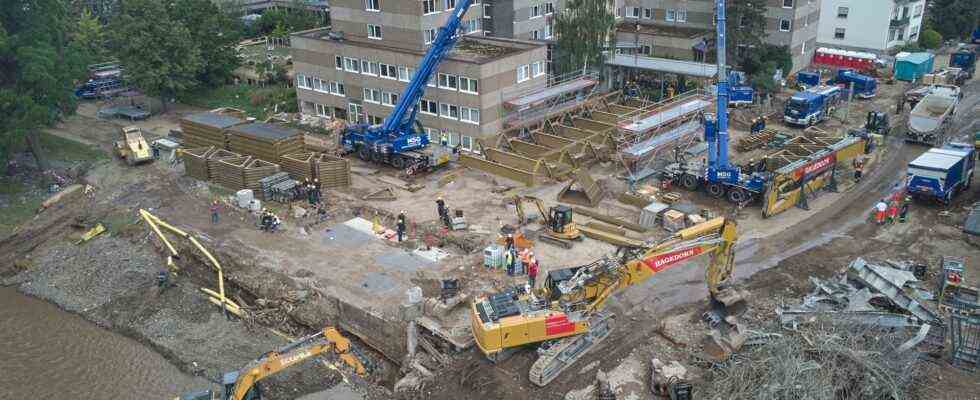Status: 07/29/2021 5:03 p.m.
The disaster control team in Rhineland-Palatinate sees a relatively stable situation on site. A temporary bridge is to be opened in Bad Neuenahr-Ahrweiler on Saturday. Doctors continue to warn of insufficient supplies and the risk of epidemics.
According to the head of the disaster control team, Thomas Linnertz, the overall situation in the areas affected by the flood disaster in Rhineland-Palatinate has achieved a “certain stability”. The focus is still on clean-up work, said the President of the Rhineland-Palatinate supervisory and service management department in Bad Neuenahr-Ahrweiler.
While the situation is stable in Sinzig, for example, the focus of operations is currently in Bad Neuenahr-Ahrweiler and Altenahr. There, the drinking water supply must also be ensured by tanks, and there is still a need for food and meals.
With a special camera system: Air Force Eurofighters document damage in the floodplain
Birgit Virnich, WDR, daily news 2 p.m., July 29, 2021
Altenahr, in turn, experienced the worst damage to private houses and infrastructure. There, too, overwater tanks, a distribution of meals and electricity generators are still necessary. “One federal state alone, Rhineland-Palatinate alone, could never have got the situation under control,” emphasized Linnertz and thanked him for the “huge support”.
Almost 6000 official helpers in action
According to operations manager Hans-Peter Plattner, there are currently 5974 helpers from disaster control, fire brigade, aid organizations, technical relief organizations (THW), the police and the German armed forces – including 1462 in Altenahr and 1368 in Bad Neuenahr. For example, the THW is taking care of clearance work, together with the fire brigade for fighting oil and pioneers of the Bundeswehr dealing with bridges, after 62 of 72 bridges had been destroyed.
Bridge of the THW in Bad Neuenahr-Ahrweiler almost finished
The new temporary bridge of the Technical Relief Organization (THW) in Bad Neuenahr-Ahrweiler is now almost finished. The 52 meter long bridge is expected to open on Saturday. After asphalt work on both sides for the driveways, the two-lane bridge could then be passable from the beginning of next week. It should also be suitable for heavy traffic and stand for about four years.
According to the spokesman, five more bridges are currently planned for the THW in the Ahr valley: three pedestrian bridges with a length of 40 meters each and two further travel bridges each 50 meters.
Spontaneous helpers are mainly needed for clean-up work to restore the infrastructure, according to Plattner. They should use the shuttles from the central assembly points in order to get to the areas of operation in a targeted manner. According to Police Adviser Florian Stadtfeld, the police are on duty during the day with around 1,000 men and eight helicopters, and 300 uniformed police officers are out and about at night.
In addition to traffic measures, the focus is on missing persons verification and corpse identification. Of the 134 dead, 80 were identified, 766 were injured and 69 were still missing.
Unclear when schools can reopen
So far, the location of the schools and when they can reopen after the end of the summer vacation on August 27 is unclear. The Rhineland-Palatinate Education Minister Stefanie Hubig met with school principals in Burgbrohl in the Ahrweiler district to get a first impression of the damage. Accordingly, more than 30 schools were damaged by the storms. “17 of them are so badly affected that we do not assume that they will be able to start again by the beginning of the new school year,” said Hubig at tagesschau24. “Overall, we are assuming damage in the three-digit million range.”
Stefanie Hubig, SPD, Education Minister Rhineland-Palatinate: “Schools and daycare centers must have high priority in reconstruction”
tagesschau24 11:30 a.m., July 29, 2021
Now, among other things, with school authorities, school supervisors and the State Office for Social Affairs, Youth and Care, it must be looked at how things can go on after the summer vacation, said Hubig. The current plan is that classes in the destroyed schools can temporarily go to other schools in neighboring towns.
In addition to the reconstruction of school buildings, one also has to take care of students and teachers who have to process what they have experienced, Hubig emphasized. The start of school after the holidays is therefore accompanied by school psychology offers.
Medical officers warn of the risk of epidemics
Despite the overall relatively stable situation, dangers remain. Medical officers criticize significant shortcomings in basic medical care in the flood areas.
The situation is “still frightening” and there is a risk of epidemics in the affected regions, said the chairwoman of the Federal Association of Doctors of the Public Health Service, Ute Teichert, the newspapers of the Funke media group. The health of the population in the disaster areas is “massively threatened because the infrastructure is not working”. Among other things, hospitals and practices were destroyed in some places. It is important to organize mobile medical units and bring them to the towns, according to Teichert, who was head of the health department in the flood-affected district of Ahrweiler until 2012.
“It is now very important that mobile medical teams come to the region”, Stephan Lenhardt, SWR, on the situation in the flood disaster area
tagesschau24 2 p.m., July 29, 2021
“Reich citizens” and “lateral thinkers” hinder auxiliary work
The federal police also sent the government an alarming report on the situation in the flood areas in North Rhine-Westphalia and Rhineland-Palatinate. As the “Bild” newspaper writes, it evaluates “supplying the population as a whole as problematic”. Many of those affected are “severely traumatized” and “acceptance of the emergency services is falling steadily”.
In Rhineland-Palatinate, according to the report, “Reich citizens in police-like uniforms” hinder the relief work, as quoted by the “Bild” newspaper. The people tried to “give emergency services relocation” – and thus to hinder the clean-up work. Previously, there had already been reports that helpers were insulted or thrown at rubbish in the disaster areas, including by so-called lateral thinkers.

